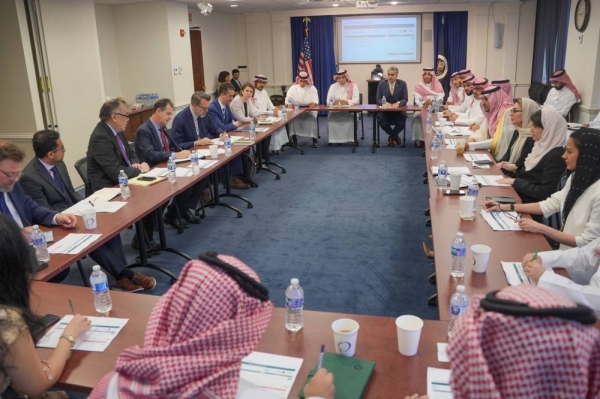The 8th Saudi-US Trade and Investment Council meeting (TIFA) was recently held in Washington, chaired by Deputy Governor of the Authority for International Relations Abdulaziz Al Sakran and the Assistant United States Trade Representative (AUSTR) for Europe and the Middle East Bryant Trick. The meeting aimed to promote bilateral trade and resolve constraints, discuss trade policies, technical regulations, sanitary and phytosanitary measures, intellectual property rights, e-commerce, and trade and investment cooperation. It also included a roundtable with Saudi and American private sector representatives to focus on promoting trade and investment in key sectors of the Kingdom, as well as addressing challenges and obstacles facing the private sector.
During the meeting, the Saudi delegation participated in various meetings and workshops to enhance trade and investment opportunities. They attended discussions on investments and opportunities in the Middle East and USA, as well as sessions on tech investments and investing in the shared future of both countries. Additionally, they took part in the fifth GCC-US Trade and Investment Dialogue, focusing on the Saudi Green and Middle East Green Initiatives, along with various bilateral themes. The delegation included representatives from multiple Saudi ministries and authorities, as well as interested Saudi companies, showcasing a strong commitment to advancing trade and investment cooperation with the United States.
One of the key focuses of the meeting was to empower small and medium enterprises (SMEs) through partnerships and strengthening their business capacities. The Saudi delegation discussed fostering cooperation in innovation, technology, and localization, highlighting the importance of SMEs in driving economic growth and creating job opportunities. By addressing obstacles facing the private sector in trade and investment, both Saudi Arabia and the United States aim to create a more conducive environment for businesses to thrive and contribute to the overall economic development of both countries.
The meeting also emphasized the importance of promoting trade and investment in major sectors of the Kingdom, including agriculture, food, pharmaceuticals, and technology. Discussions centered around enhancing cooperation in these sectors, as well as exploring new opportunities for collaboration. The exchange of experiences and best practices between Saudi and American companies is vital for mutual growth and prosperity, as both countries seek to expand their trade and investment relationships to strengthen their economies and create more business opportunities for their citizens.
In addition to discussing trade and investment cooperation, the meeting also touched upon intellectual property rights policies and legislation, highlighting the significance of protecting intellectual property in fostering innovation and competitiveness. E-commerce, another key topic of discussion, is rapidly growing in importance as businesses adapt to the digital economy. By addressing policies and regulations related to e-commerce, both Saudi Arabia and the United States can facilitate smoother trade transactions and create a more efficient and secure online marketplace for businesses and consumers.
Overall, the 8th Saudi-US Trade and Investment Council meeting served as a platform for both countries to enhance their trade and investment cooperation, address challenges facing the private sector, and explore new opportunities for collaboration in key sectors of the Kingdom. With a strong commitment from both sides to promote bilateral trade and resolve constraints, the meeting laid the foundation for a more robust and dynamic economic partnership between Saudi Arabia and the United States, benefiting businesses and citizens in both countries.





















